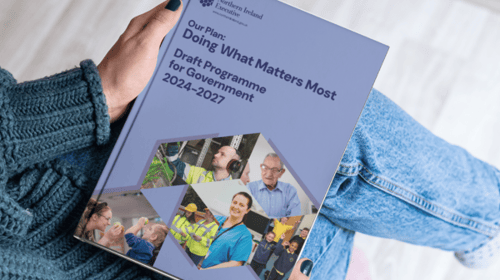Recently, I spent time with Nichola Mallon, former Infrastructure Minister and SDLP MLA, who shared her experience of losing her seat in the last election. On that day, she received a wave of appreciation from people across the country, starkly contrasting the constant criticism she often faced while performing a difficult job under intense scrutiny.
This made me reflect on the role of evangelical Christians as good citizens in Northern Ireland. Should we engage in public conversations and political debates? Absolutely! The gospel urges us to care for our community, love our neighbours, and pray for our leaders. We can’t do that if we’re not involved.
We should also hold our representatives accountable. Nichola prefers the term “public servant,” and so do I. Politicians are elected to serve, and it’s our job to guide and hold them accountable. But, it’s also our responsibility to commend them when they do well. When was the last time you contacted a local representative to say, “Well done!”?
With this in mind, I’m reviewing the recently published Draft Programme for Government 2024 – 2027, ‘Our Plan: Doing What Matters Most.’ It outlines the key priorities our Executive has agreed to work on this year and throughout this mandate, based on a ‘Wellbeing Framework’ aimed at making a real difference in people’s lives.
There are nine key priorities:
1. Grow a globally competitive and sustainable economy.
2. Deliver more affordable childcare.
3. Cut health waiting times.
4. End violence against women and girls.
5. Better support for children and young people with special educational needs.
6. Provide more social, affordable, and sustainable housing.
7. Safer communities.
8. Protect Lough Neagh and the environment.
9. Reform and transform public services.
My critical response is to ask where the strategic details are to back up these broad ambitions and how we’ll fund these projects with a tight government budget. I’m also disappointed by the omission of the Anti-Poverty Strategy promised in legislation for over 25 years. Tackling poverty is fundamental and must be addressed if our government is to make a meaningful difference in the lives of ordinary people.
However, there are aspects of the draft Programme for Government I can praise. I appreciate the wellbeing framework aimed at societal flourishing, which reminds me of Jeremiah 29:7, where the exiles are called to seek the shalom of the city. I also applaud the Executive’s commitment to work together in genuine cooperation as respectful colleagues to deliver this plan. Building confidence in our government’s stability is crucial.
Moreover, the Executive has opened the programme to consultation, inviting input from all sections of the community, including evangelical Christians. This openness is vital as it is intended to be a programme for everyone.
What questions do you have about the Programme for Government? What is currently missing in your opinion, what else should be included? Do you have something good to say about it? Can you lay out your questions and frustrations while also offering praise and encouragement to the Executive team and civil servants working hard to deliver hope and a future for Northern Ireland? Surely this is our role as evangelical Christians and good citizens in Northern Ireland.
Philippians 4:8 – 9 (NIV), “Finally, brothers and sisters, whatever is true, whatever is noble, whatever is right, whatever is pure, whatever is lovely, whatever is admirable — if anything is excellent or praiseworthy — think about such things.”
The public consultation closes on 4, November 2024, and we will have pointers in the weeks ahead to help you respond. So now, over to you.



